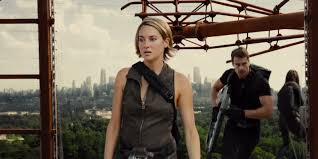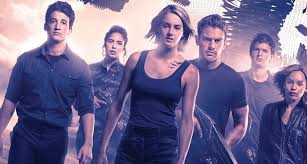🎬 Allegiant (2016)

“Allegiant” (2016): A Struggle to Stay Afloat in a Sinking Franchise
As the third installment in the Divergent series, Allegiant (2016) was expected to build on the momentum of its predecessors, diving deeper into its dystopian world and delivering thrilling revelations. Directed by Robert Schwentke, Allegiant promised to take audiences beyond the wall surrounding Chicago, expanding the scope of the narrative. However, what unfolds is a muddled and uninspired film that struggles to maintain the intrigue of its source material and the expectations of its audience.
Plot Overview
Allegiant picks up where Insurgent left off, with Tris Prior (Shailene Woodley) and her companions uncovering a message that reveals their city of Chicago was part of a larger experiment. Determined to discover the truth, Tris, along with Four (Theo James), Caleb (Ansel Elgort), Christina (Zoë Kravitz), and Peter (Miles Teller), ventures beyond the wall into an uncharted wasteland. There, they encounter the Bureau of Genetic Welfare, an organization led by David (Jeff Daniels), which claims to oversee the experiment and restore humanity’s genetic purity.
As Tris learns more about the Bureau’s true motives, she is torn between her belief in their vision and the growing mistrust of her allies. Meanwhile, Four uncovers a more sinister side to the Bureau’s plans, sparking tensions between the group and threatening to unravel their unity.
Themes: Identity, Trust, and Power
The Divergent series has always grappled with themes of identity and individuality, and Allegiant attempts to continue that exploration. Tris’s journey in this installment revolves around her grappling with her unique role as a “genetically pure” individual and the moral dilemmas posed by the Bureau’s vision of genetic engineering.
The film also delves into themes of trust, particularly between Tris and Four, as their differing views on the Bureau’s intentions strain their relationship. However, the execution is lackluster, with the emotional stakes feeling forced rather than organic.
Power and control remain central to the narrative, with the Bureau representing yet another authoritarian force manipulating humanity under the guise of benevolence. This echoes earlier films but lacks the sharp critique of dystopian systems that made Divergent compelling.
Character Performances
Shailene Woodley as Tris Prior
Shailene Woodley continues to deliver a strong performance as Tris, bringing emotional nuance to a character caught between hope and disillusionment. However, the script gives her little room to grow, leaving Tris feeling stagnant compared to her previous arcs. Woodley’s talent shines in moments of vulnerability, but the film fails to capitalize on her potential.
Theo James as Tobias “Four” Eaton
Theo James remains a steady presence as Four, offering a grounded counterpoint to Tris’s idealism. His character’s skepticism and sense of justice add depth to the narrative, but like Tris, Four’s development feels limited. James’s chemistry with Woodley is present but underutilized, as the film spends more time on plot mechanics than character dynamics.
Jeff Daniels as David
Jeff Daniels brings a calm yet sinister energy to David, the Bureau’s enigmatic leader. His performance conveys a veneer of benevolence masking a manipulative agenda, making him an intriguing antagonist. However, the character’s motivations are underexplored, reducing his impact as a villain.
Supporting Cast
- Miles Teller (Peter) provides much-needed humor and unpredictability, though his character’s motivations remain inconsistent.
- Zoë Kravitz (Christina) and Ansel Elgort (Caleb) are largely sidelined, with little to do beyond reacting to the unfolding events.
- Naomi Watts (Evelyn) and Octavia Spencer (Johanna) return as faction leaders in Chicago but are relegated to subplots that feel disconnected from the main narrative.

World-Building and Visuals
One of Allegiant’s biggest promises was to expand the Divergent universe by venturing beyond the wall. The post-apocalyptic wasteland and the Bureau’s high-tech facilities are visually striking but lack the depth and imagination needed to make them memorable. The stark red landscapes and futuristic designs feel generic, offering little to differentiate this dystopian world from countless others.
The film introduces the concept of genetic engineering and the divide between “pure” and “damaged” individuals, but it fails to explore these ideas in a meaningful way. What could have been a thought-provoking commentary on eugenics and social stratification is reduced to a shallow plot device.
Action and Pacing
Allegiant features several action sequences, including daring escapes, aerial chases, and battles against the Bureau’s forces. While competently executed, these scenes lack the intensity and innovation that defined earlier entries in the series. The stakes feel artificial, with the characters facing peril without significant consequences.
The pacing is uneven, with the first act rushing through the group’s journey beyond the wall and the second act bogged down by exposition. The film builds toward a climactic showdown that lacks emotional weight, leaving the resolution feeling anticlimactic and unsatisfying.
Strengths and Weaknesses
Strengths:
- Shailene Woodley’s Performance: Despite the weak script, Woodley continues to bring sincerity and depth to Tris.
- Visual Effects: The film’s production design and special effects are polished, creating a visually engaging experience.
- Miles Teller’s Humor: Teller’s performance as Peter adds a layer of levity to the otherwise serious tone.
Weaknesses:
- Lackluster Writing: The script struggles to balance its complex ideas with engaging storytelling, resulting in a disjointed narrative.
- Underdeveloped Characters: Many characters are sidelined or reduced to clichés, diminishing the emotional stakes.
- Uneven Pacing: The film’s structure feels rushed and unfocused, failing to build momentum or sustain tension.
- Unresolved Plot Threads: As the penultimate entry in the series, Allegiant introduces more questions than it answers, leaving viewers frustrated rather than eager for the conclusion.

Comparisons and Legacy
Allegiant draws inevitable comparisons to other young adult dystopian franchises, such as The Hunger Games and The Maze Runner. Unlike The Hunger Games: Mockingjay – Part 1, which successfully built anticipation for its finale, Allegiant feels like a misstep that undercuts its own momentum.
The decision to split Veronica Roth’s final novel into two films, a trend popularized by franchises like Harry Potter and Twilight, ultimately works against Allegiant. The story lacks enough material to justify its runtime, resulting in a film that feels stretched thin and incomplete.
Missed Opportunities
- Exploration of Genetic Engineering: The film introduces the idea of genetic “purity” but fails to engage with its ethical and social implications, leaving a potentially rich theme underexplored.
- Character Development: Tris and Four’s relationship, as well as the arcs of supporting characters, could have been deepened to create stronger emotional resonance.
- Integration of Subplots: The political tensions in Chicago are treated as an afterthought, despite their potential to add complexity and stakes to the narrative.
Conclusion
Allegiant (2016) is a visually polished but narratively underwhelming installment in the Divergent series. While it hints at intriguing ideas and features strong performances from its cast, the film ultimately succumbs to weak writing, uneven pacing, and a lack of emotional depth. It struggles to justify its place as a penultimate chapter, leaving both fans and newcomers unsatisfied.
For those invested in the series, Allegiant may serve as a necessary bridge to the final chapter, but it falls far short of the promise set by the original Divergent. As a standalone film, it lacks the coherence and impact needed to stand out in the crowded landscape of dystopian cinema.
Rating: 5/10